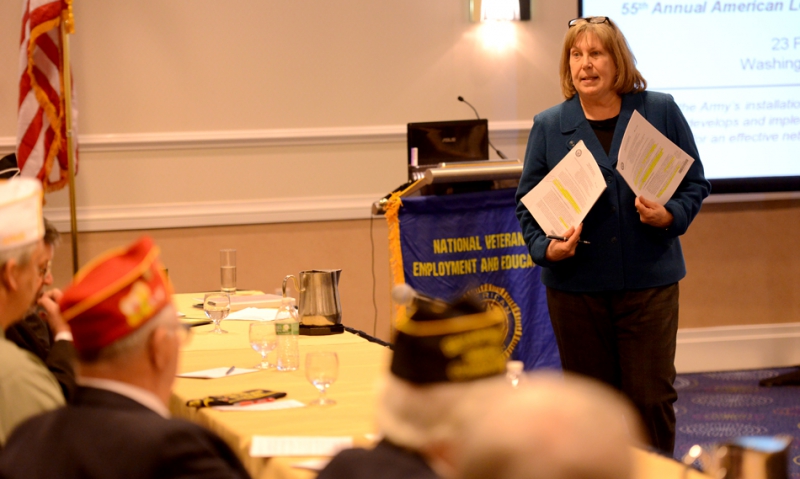
Legion briefed on recent Department of Defense directives calling for greater access to military installations for service organizations.
In late December, then-Department of Defense Secretary Chuck Hagel issued two directives to each of the military services that would allow for greater access to military installations for nonprofit organizations and veterans service organizations (VSOs), such as The American Legion.
The hope now is that the Legion and others will take advantage of that access, U.S. Army officials told the organization’s Veterans Employment & Education Division Feb. 23 during the Washington Conference.
“That’s why (Hagel) signed these memos out: to strengthen your ability to access installations across the Department of Defense,” said Carla Coulson, director of Installation Services in the U.S. Army’s Office of the Assistant Chief of Staff. “I think (Hagel) heard you and heard other VSOs’ and (military service organizations’) concerns. Our soldiers transitioning out have a lot of challenges. We need your help.
“It’s all about relationships. The dialogue you have back and forth with the Army. I think things like this, improved access, will allow you to develop a better relationship with the senior leaders on an Army installation.”
One of the directives issued by Hagel called for greater access and support services to “VA-recognized Veteran Service and Military Service Organizations,” while the second called for access and support services to “Nonprofit Non-federal entities.”
Because it’s recognized by the Department of Veterans Affairs as being accredited to represent veterans on VA claims, Legion reps already are – by law – allowed on military installations and are provided space and resources to file and process claims for soldiers transitioning out of the military.
Coulson said Hagel’s second directive was designed to ensure there was a consistent practice across the military when it came to allowing installation access. “Even with the Army … we’d seen some inconsistencies from time to time,” she said. “It’s all about relationships. If you have a relationship with a garrison commander or a senior commander, your access may be a little bit easier than if you don’t have a relationship. Your access could be liberal or a little bit restrictive.”
With better access, Coulson hopes that the Legion and other organizations can step up and help servicemembers transitioning out of the military be more prepared for that transition. One way she specifically mentioned was the need for financial counseling.
“One of the biggest deficits I believe we have is services for financial readiness,” she said. “We have soldiers and families who are leaving the military and can’t budget, who are going to be receiving some type of benefit … and they’re not really able to think about that in terms of ‘what do I do next?’”
Coulson said that services provided by organizations granted access to installations need to be meet specific needs. “I think all of you in your states probably have a good idea with respect to what the needs are,” she said.
Both of Hagel’s directives were issued Dec. 23; the 60-day waiting period has expired so implementation of both has begun. “We will have the guidance out shortly,” Coulson said. “Army’s Installation Management Command in San Antonio will then issue more directive guidance to garrison commanders.”
Robert Hansgen, who handles community outreach in the Soldier and Family Readiness Division of the Army’s Installation Management Command, added, "We certainly want to enhance your availability to get on post and to encourage commanders to find ways to work with you all to come on post."
- Washington Conference

